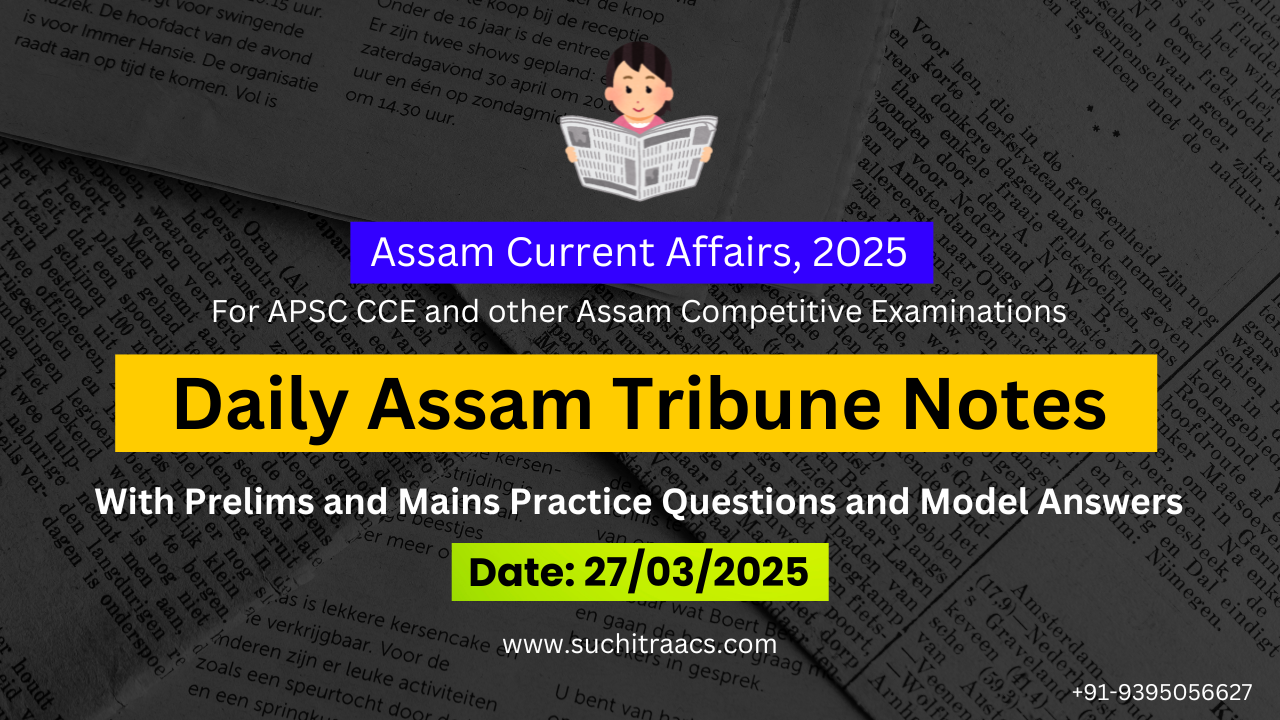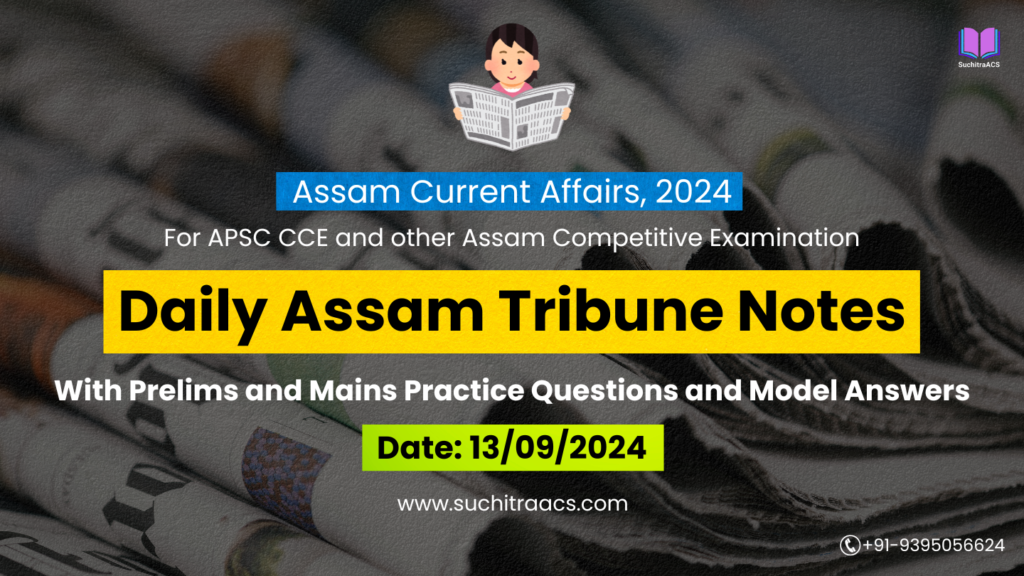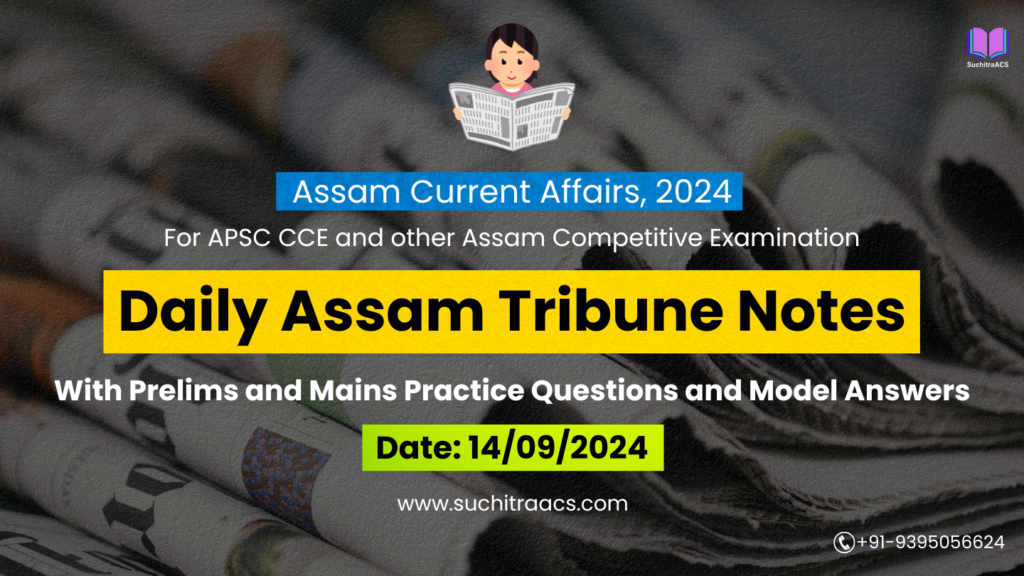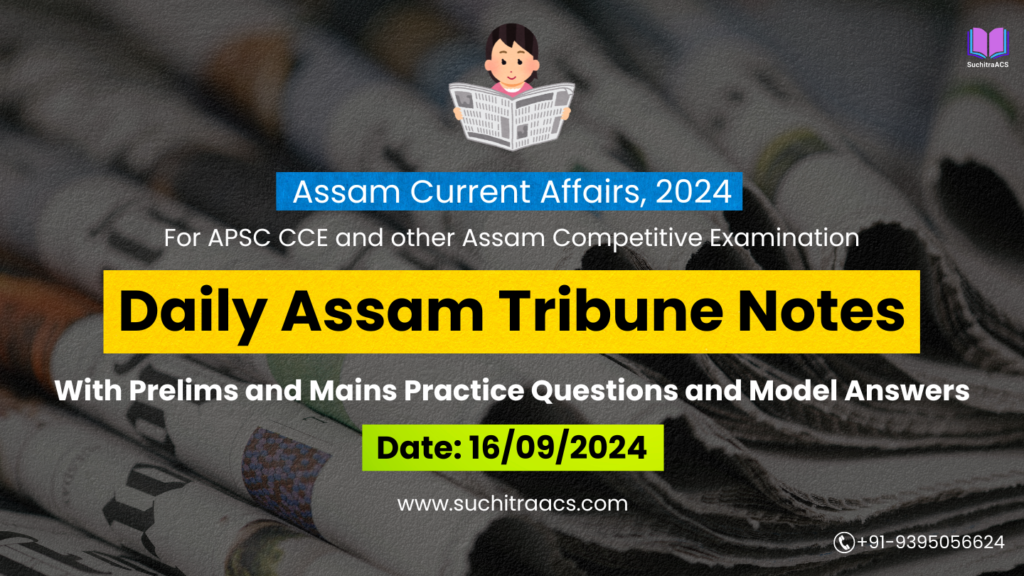APSC Current Affairs: Assam Tribune Notes with MCQs and Answer Writing (27/03/2025)
For APSC CCE and other Assam Competitive examinations aspirants, staying updated with current affairs is vital. This blog covers most important topics from the Assam Tribune today (27-03-2025). These issues are key for both APSC Prelims and Mains preparation, offering insights into the APSC CCE Syllabus.
1. Property Tax Compliance and Urban Governance in Guwahati
GS Paper 2 (Mains): Governance, Polity; GS Paper 3 (Mains): Urbanization; GS Prelims: Current Events, Governance
Introduction
The Guwahati Municipal Corporation (GMC) has issued a notice urging property owners in Guwahati to clear outstanding property taxes by March 31, 2025, to avoid a 20% penalty and potential property attachment under the GMC Act, 1971. This initiative reflects the broader challenges of urban governance, revenue mobilization, and citizen compliance in rapidly urbanizing cities like Guwahati, the largest urban center in Assam. Effective tax collection is crucial for funding civic amenities and infrastructure, aligning with sustainable urban development goals.
Key Points
- GMC’s Property Tax Notice:
- Deadline: March 31, 2025.
- Penalty: 20% for fiscal year 2025-26 if unpaid by April 1, 2025.
- Legal Action: Property attachment under Sections 188 and 189 of the GMC Act, 1971 for continued non-compliance.
- Facilitation: GMC zonal offices open on March 30 (Sunday) and March 31 (Monday), with online payment options at https://gmcpropertytax.com.
- Significance of Property Tax in Urban Governance:
- Primary revenue source for municipal bodies to fund services like water supply, sanitation, roads, and waste management.
- Ensures financial autonomy for local governments under the 74th Constitutional Amendment Act.
- Context in Guwahati:
- Rapid urbanization has increased demand for civic infrastructure.
- Challenges include tax evasion, outdated property records, and resistance from citizens due to perceived lack of service delivery.
- Support Mechanisms:
- Helpline numbers provided for different zones (e.g., West & Central: 7099069626).
- Push for digital payments to enhance transparency and ease of compliance.
Prelims Pointers
- GMC Act, 1971: Legal framework governing Guwahati Municipal Corporation, including provisions for tax collection and property attachment (Sections 188, 189).
- Property Tax: A key municipal revenue source levied on property owners for urban development.
- 74th Amendment Act, 1992: Empowers urban local bodies (ULBs) like GMC with financial and administrative autonomy.
- Current Event: GMC’s deadline of March 31, 2025, for property tax clearance with a 20% penalty for non-compliance.
Mains Pointers
Importance of Property Tax Compliance in Urban Governance
- Revenue Mobilization:
- Funds essential services like waste management, street lighting, and public health in Guwahati.
- Reduces dependency on state or central government grants.
- Urban Development:
- Supports infrastructure upgrades in a city facing population growth and unplanned expansion.
- Aligns with Smart Cities Mission goals for sustainable urban planning.
- Citizen Accountability:
- Strengthens the social contract between residents and local government.
- Promotes transparency when tax revenue visibly improves civic amenities.
Challenges in Implementation
- Low Compliance Rates:
- Lack of awareness or unwillingness among property owners to pay taxes.
- Disputes over property valuation and outdated tax records.
- Administrative Gaps:
- Insufficient staff and resources at GMC to enforce tax collection effectively.
- Limited digitization of property records hampers tracking and enforcement.
- Urbanization Pressures:
- Rapid growth in Guwahati strains infrastructure, leading to dissatisfaction with service delivery and resistance to tax payment.
Government Initiatives Supporting Urban Governance
- Smart Cities Mission:
- Guwahati included for infrastructure development, indirectly supporting tax-funded projects.
- Digital India Campaign:
- GMC’s online payment portal (https://gmcpropertytax.com) aligns with e-governance efforts.
- Assam Urban Infrastructure Investment Program (AUIIP):
- Funded by ADB, it aims to improve urban services, necessitating robust local revenue like property tax.
- 74th Amendment Implementation:
- Strengthens GMC’s authority to levy and collect taxes for self-sustainability.
Way Ahead
- Awareness Campaigns:
- Educate citizens on the link between tax compliance and civic improvements through media and community outreach.
- Digitization and Transparency:
- Update property records using GIS mapping and ensure tax utilization is publicly reported.
- Incentives and Enforcement:
- Offer discounts for early payment and stricter penalties for habitual defaulters.
- Capacity Building:
- Train GMC staff and enhance technological infrastructure for efficient tax administration.
Conclusion
Property tax compliance is a cornerstone of effective urban governance in Guwahati, enabling the GMC to meet the demands of a growing population. While challenges like low awareness and administrative inefficiencies persist, leveraging digital tools, citizen engagement, and legal enforcement can ensure sustainable urban development. This aligns with Assam’s broader governance goals, making it a critical topic for APSC CCE aspirants to understand in the context of polity and urbanization.
2. Assam’s Geo-Political Importance and India-Germany Relations
GS Paper 2 (Mains): International Relations, Polity; GS Paper 5 (Mains): Governance and International Relations of Assam; GS Prelims: Current Events, India and its Neighborhood
Introduction
On March 27, 2025, The Assam Tribune reported German Ambassador Dr. Philipp Ackermann’s statement during a meeting with the Governor of Assam: “Considering Assam’s geo-political importance and its proximity to South East Asian nations, the State can play a vital role in infusing more momentum to the relations between India and Germany.” This highlights Assam’s strategic position as a gateway to Southeast Asia and its potential to enhance bilateral ties with Germany, a key European partner. The topic resonates with Assam’s role in India’s foreign policy and regional development.
Key Points
- Assam’s Geo-Political Significance:
- Borders Bhutan, Bangladesh, and Myanmar, making it a critical link to South and Southeast Asia.
- Part of India’s Act East Policy, aimed at strengthening ties with ASEAN countries.
- Rich in natural resources (tea, oil, gas), enhancing its economic appeal for international partnerships.
- India-Germany Relations:
- Strong economic ties: Germany is India’s largest trading partner in the EU (bilateral trade ~€25 billion in 2023).
- Focus areas: Green energy, technology, infrastructure, and skill development.
- Recent developments: Germany’s “Focus on India” strategy (2023) emphasizes deeper collaboration.
- Assam’s Role in Bilateral Ties:
- Potential for German investments in Assam’s tea industry, renewable energy, and infrastructure.
- Connectivity projects like the India-Myanmar-Thailand Trilateral Highway boost Assam’s trade prospects.
- Cultural and educational exchanges could strengthen people-to-people ties.
- Current Event Context:
- The German Ambassador’s visit underscores Assam’s growing international relevance.
- Aligns with India’s push for decentralized diplomacy involving states in foreign relations.
Prelims Pointers
- Act East Policy: India’s foreign policy initiative to enhance ties with Southeast Asia, with Assam as a key hub.
- India-Germany Bilateral Trade: Germany is India’s top EU trading partner (€25 billion in 2023).
- Assam’s Strategic Location: Borders Bhutan, Bangladesh, and Myanmar; gateway to ASEAN nations.
- Current Event: German Ambassador Dr. Philipp Ackermann’s visit to Assam on March 27, 2025, highlighting its geo-political role.
Mains Pointers
Importance of Assam in India-Germany Relations
- Economic Opportunities:
- Assam’s tea, oil, and silk industries align with Germany’s demand for quality goods and sustainable practices.
- German expertise in renewable energy can support Assam’s green energy goals.
- Strategic Connectivity:
- Assam’s proximity to Southeast Asia enhances India’s Act East Policy, with Germany as a potential partner in infrastructure projects.
- Strengthens India’s role in Indo-Pacific geopolitics.
- Decentralized Diplomacy:
- State-level engagements (like Assam-German ties) reflect India’s evolving foreign policy approach.
- Boosts Assam’s visibility on the global stage.
Challenges in Leveraging Assam’s Potential
- Infrastructure Deficit:
- Poor road and rail connectivity hampers trade and investment inflows.
- Limited industrial base restricts large-scale German collaboration.
- Security Concerns:
- Proximity to insurgency-prone borders (e.g., Myanmar) poses risks for investors.
- Internal issues like ethnic tensions could deter foreign engagement.
- Capacity Constraints:
- Lack of skilled manpower in Assam to meet German industrial standards.
- Limited awareness of international trade protocols among local businesses.
Government Initiatives Supporting Assam’s Role
- Act East Policy (2014):
- Positions Assam as a trade and connectivity hub with Southeast Asia.
- India-Germany Strategic Partnership:
- Intergovernmental Consultations (IGC) every two years focus on technology and sustainability, relevant to Assam.
- North East Industrial Development Scheme (NEIDS):
- Promotes industrial growth in Assam, attracting foreign investment.
- Assam’s Look East Initiatives:
- State-led efforts like the Assam Investment Summit encourage global partnerships.
Way Ahead
- Infrastructure Development:
- Accelerate projects like the Trilateral Highway and inland waterways to connect Assam with Southeast Asia.
- Skill Development:
- Collaborate with German institutions for vocational training in Assam’s youth.
- Investment Promotion:
- Create special economic zones (SEZs) in Assam tailored for German industries like manufacturing and renewable energy.
- Security and Stability:
- Strengthen border management and resolve internal conflicts to build investor confidence.
Conclusion
Assam’s geo-political importance offers a unique opportunity to deepen India-Germany relations, fostering economic growth and regional connectivity. By addressing infrastructure gaps, security challenges, and skill deficits, Assam can emerge as a pivotal player in India’s international outreach, particularly under the Act East Policy. This development is a significant point of study for APSC CCE aspirants, reflecting Assam’s evolving role in governance and global affairs.
3. National Tribal Film & Literature Festival 2025 in Assam
GS Paper 1 (Mains): Indian Heritage, Culture, and Society; GS Paper 5 (Mains): History, Art, Culture, Tradition & Heritage of Assam; GS Prelims: Current Events, Culture
Introduction
The Assam Tribune reported on March 27, 2025, that the National Tribal Film & Literature Festival 2025 will commence in Assam, highlighting the state’s rich tribal heritage through cinematic and literary expressions. This event celebrates the cultural diversity of Assam’s indigenous communities, aligning with efforts to preserve and promote tribal traditions. It reflects Assam’s socio-cultural significance and its contribution to India’s pluralistic identity, making it a pertinent topic for APSC CCE aspirants.
Key Points
Event Overview:
The National Tribal Film & Literature Festival 2025 begins in Assam on March 27, 2025.
Focus: Showcasing tribal narratives through films, literature, and discussions.
Venue: Likely Guwahati or a culturally significant location in Assam (specifics not detailed in the newspaper).
Assam’s Tribal Heritage:
Home to tribes like Bodo, Mising, Karbi, Dimasa, and Rabha, constituting about 13% of the state’s population (Census 2011).
Rich traditions in folk music, dance (e.g., Bihu, Bagurumba), and oral literature.
Historical significance: Tribal communities played key roles in Assam’s freedom movement and cultural evolution.
Cultural Significance:
Promotes tribal voices often underrepresented in mainstream media.
Strengthens Assam’s identity as a cultural mosaic within India.
Encourages tourism and cultural exchange, boosting the local economy.
Relevance to Syllabus:
Ties into APSC’s emphasis on Assam’s history, heritage, and socio-cultural issues.
Reflects national efforts to integrate tribal communities into the developmental mainstream.
Prelims Pointers
National Tribal Film & Literature Festival 2025: A cultural event starting March 27, 2025, in Assam to celebrate tribal heritage.
Major Tribes of Assam: Bodo, Mising, Karbi, Dimasa, Rabha—known for unique traditions and languages.
Cultural Practices: Folk dances like Bagurumba (Bodo) and festivals like Ali-Aye-Ligang (Mising) reflect Assam’s tribal diversity.
Current Event: Festival highlights Assam’s role in preserving tribal culture through film and literature.
Mains Pointers
Importance of the Festival
Cultural Preservation:
Provides a platform to document and revive tribal languages, stories, and traditions at risk of fading.
Enhances national awareness of Assam’s indigenous heritage.
Social Inclusion:
Empowers tribal communities by amplifying their voices in mainstream discourse.
Aligns with India’s constitutional commitment to tribal welfare (e.g., Schedule V).
Economic Impact:
Boosts cultural tourism in Assam, supporting local artisans and filmmakers.
Promotes creative industries, fostering employment opportunities.
Challenges in Promoting Tribal Culture
Modernization Pressures:
Urbanization and globalization threaten traditional lifestyles and languages.
Younger generations shifting away from tribal customs.
Resource Constraints:
Limited funding for cultural preservation projects and festivals.
Lack of infrastructure to support large-scale tribal art promotion.
Representation Gaps:
Stereotyping or underrepresentation of tribal narratives in mainstream media.
Insufficient tribal participation in decision-making for such events.
Government Initiatives Supporting Tribal Culture
Tribal Sub-Plan (TSP):
Allocates funds for tribal development, including cultural preservation in Assam.
Assam Accord (1985):
Recognizes the cultural identity of Assam’s indigenous people, including tribes.
Ministry of Tribal Affairs Schemes:
Programs like “Support to Tribal Research Institutes” fund documentation of tribal heritage.
Assam’s Cultural Policies:
State initiatives like the Assam State Film Awards encourage tribal filmmaking.
Way Ahead
Education and Awareness:
Integrate tribal history and culture into school curricula in Assam.
Conduct workshops to engage youth in preserving their heritage.
Funding and Infrastructure:
Increase budgetary allocation for tribal festivals and cultural centers.
Develop digital archives for tribal films and literature.
Community Participation:
Ensure tribal leaders and artists lead festival planning and execution.
Promote collaborations between tribal creators and national filmmakers.
Conclusion
The National Tribal Film & Literature Festival 2025 in Assam is a significant step toward celebrating and safeguarding the state’s tribal heritage. By addressing challenges like modernization and resource scarcity, Assam can leverage such events to foster cultural pride, social inclusion, and economic growth. This topic underscores the importance of cultural diversity in Assam’s identity, a key focus for APSC CCE preparation.
4. Concern Over Privatization of Assam’s Power Sector
GS Paper 3 (Mains): Infrastructure, Economic Development; GS Paper 5 (Mains): Economy of Assam; GS Prelims: Current Events, Economic Development
Introduction
On March 27, 2025, The Assam Tribune reported concerns over the “privatization” of Assam’s power sector, as highlighted in an article titled “Concern over ‘privatization’ of power sector.” This development reflects ongoing debates about the efficiency, accessibility, and affordability of electricity in Assam, a state heavily reliant on its power infrastructure for economic growth. Privatization aims to improve service delivery but raises issues of equity and public welfare, making it a critical topic for APSC CCE aspirants.
Key Points
Context of Privatization in Assam:
Assam Power Distribution Company Limited (APDCL) manages electricity distribution.
Concerns stem from potential moves to involve private players in distribution or generation, as reported in the newspaper.
Historical backdrop: Power sector reforms in India began with the Electricity Act, 2003, encouraging private participation.
Current Status of Assam’s Power Sector:
Installed capacity: ~2,000 MW (2023 data), with significant reliance on hydropower and thermal sources.
Challenges: Transmission losses (~20%), rural electrification gaps, and financial losses of APDCL.
Achievements: Improved rural electrification under schemes like Saubhagya.
Arguments For and Against Privatization:
For: Enhanced efficiency, reduced losses, and better infrastructure through private investment.
Against: Risk of higher tariffs, neglect of rural areas, and loss of public control over a critical utility.
Relevance to Assam:
Power is vital for industrial growth, agriculture (e.g., irrigation), and urban development in Guwahati.
Privatization debates tie into Assam’s economic development and governance priorities.
Prelims Pointers
Electricity Act, 2003: Legal framework promoting private participation in India’s power sector.
APDCL: Assam Power Distribution Company Limited, the state’s primary electricity distributor.
Saubhagya Scheme: National initiative (2017) to electrify all households, including in Assam.
Current Event: Concerns over power sector privatization in Assam reported on March 27, 2025.
Mains Pointers
Importance of Power Sector Reforms in Assam
Economic Growth:
Reliable electricity supports industries, MSMEs, and tea plantations, key to Assam’s economy.
Attracts private investment, boosting job creation.
Infrastructure Development:
Privatization could modernize aging power grids and reduce transmission losses.
Enhances urban and rural connectivity, aligning with Smart Cities Mission goals for Guwahati.
Energy Access:
Improves service delivery, addressing frequent outages and voltage issues in rural Assam.
Challenges in Privatization
Affordability Concerns:
Private firms may prioritize profit, leading to higher tariffs unaffordable for low-income households.
Rural areas risk being underserved due to low revenue potential.
Financial Viability:
APDCL’s existing debt (~₹2,000 crore as of 2023) complicates privatization transitions.
High initial costs for private players to upgrade infrastructure.
Public Resistance:
Fear of job losses for public sector employees and loss of state control over a public good.
Lack of trust in private entities based on experiences in other states (e.g., Delhi’s mixed outcomes).
Government Initiatives Supporting Assam’s Power Sector
UDAY Scheme (2015):
Aimed to reduce APDCL’s financial losses and improve operational efficiency.
Revamped Distribution Sector Scheme (RDSS):
Central scheme (2021) to modernize distribution, reduce losses, and support smart metering in Assam.
Assam Power Sector Investment Program:
ADB-funded initiative to enhance transmission and distribution infrastructure.
Renewable Energy Push:
State targets 1,000 MW solar capacity by 2030, encouraging private participation.
Way Ahead
Balanced Approach:
Adopt a hybrid model with public-private partnerships (PPPs) to retain oversight while leveraging private efficiency.
Subsidies and Regulation:
Ensure subsidies for vulnerable groups and strict tariff regulation by Assam Electricity Regulatory Commission (AERC).
Community Engagement:
Address public concerns through transparent consultations and awareness campaigns.
Infrastructure Upgrades:
Prioritize smart grids and renewable integration to make Assam’s power sector attractive for private investment.
Conclusion
The debate over privatizing Assam’s power sector underscores the tension between efficiency and equity in a state striving for economic development. While privatization offers potential for modernization and reliability, it must be balanced with safeguards to protect rural consumers and maintain affordability. For APSC CCE aspirants, this topic highlights Assam’s economic challenges and the role of governance in shaping critical infrastructure.
APSC Prelims Practice Questions
Topic 1: Property Tax Compliance and Urban Governance in Guwahati
Question 1 (Assertion-Reason Type)
Assertion (A): The Guwahati Municipal Corporation (GMC) can attach properties for non-payment of taxes under the GMC Act, 1971.
Reason (R): The 74th Constitutional Amendment Act mandates urban local bodies to enforce tax compliance through legal measures.
A) Both A and R are true, and R is the correct explanation of A.
B) Both A and R are true, but R is not the correct explanation of A.
C) A is true, but R is false.
D) A is false, but R is true.
Answer: B) Both A and R are true, but R is not the correct explanation of A.
Explanation:
- Assertion (A): True. The newspaper states that under Sections 188 and 189 of the GMC Act, 1971, the GMC can attach properties for continued non-payment of taxes.
- Reason (R): True. The 74th Constitutional Amendment Act (1992) empowers urban local bodies (ULBs) like GMC with financial autonomy and responsibilities, including tax collection. However, it does not specifically mandate legal measures like property attachment; this authority stems from the GMC Act itself, not the amendment. Thus, R is not the correct explanation of A.
Topic 2: Assam’s Geo-Political Importance and India-Germany Relations
Question 2 (Match the Following Type)
Match the following initiatives with their objectives related to Assam’s geo-political role:
| Column A (Initiative) | Column B (Objective) |
| 1. Act East Policy | A. Enhance trade with Southeast Asia |
| 2. India-Myanmar-Thailand Highway | B. Strengthen India-Germany bilateral ties |
| 3. German Ambassador’s Visit 2025 | C. Improve regional connectivity through Assam |
A) 1-A, 2-C, 3-B
B) 1-C, 2-A, 3-B
C) 1-A, 2-B, 3-C
D) 1-B, 2-C, 3-A
Answer: A) 1-A, 2-C, 3-B
Explanation:
- 1. Act East Policy: Launched in 2014, it aims to enhance trade and connectivity with Southeast Asia, with Assam as a key hub (A).
- 2. India-Myanmar-Thailand Highway: A connectivity project boosting Assam’s role as a gateway to Southeast Asia (C).
- 3. German Ambassador’s Visit 2025: Reported on March 27, 2025, it highlights Assam’s potential to strengthen India-Germany ties (B).
Topic 3: National Tribal Film & Literature Festival 2025 in Assam
Question 3 (Single-Statement Type)
Which one of the following tribes of Assam is associated with the Bagurumba dance, a cultural element likely to be showcased at the National Tribal Film & Literature Festival 2025?
A) Mising
B) Bodo
C) Karbi
D) Rabha
Answer: B) Bodo
Explanation:
- The Bagurumba dance is a traditional folk dance of the Bodo tribe, one of Assam’s prominent indigenous communities. The National Tribal Film & Literature Festival 2025, starting March 27, 2025, in Assam, aims to celebrate such tribal cultural expressions. Other tribes like Mising (Ali-Aye-Ligang), Karbi, and Rabha have distinct traditions, but Bagurumba is specifically linked to the Bodos.
Topic 4: Concern Over Privatization of Assam’s Power Sector
Question 4 (Multiple-Choice Type)
With reference to Assam’s power sector, which of the following statements is/are correct?
- The Assam Power Distribution Company Limited (APDCL) has faced financial losses partly due to high transmission losses.
- The Revamped Distribution Sector Scheme (RDSS) aims to reduce distribution losses and introduce smart metering in Assam.
- Privatization of the power sector in Assam is mandated under the Electricity Act, 2003.
A) 1 and 2 only
B) 2 and 3 only
C) 1 and 3 only
D) 3 only
Answer: A) 1 and 2 only
Explanation:
Statement 3: Incorrect. The Electricity Act, 2003, encourages private participation to improve efficiency but does not mandate privatization. It allows states flexibility, and Assam’s privatization is a policy choice, not a legal requirement.
Statement 1: Correct. APDCL has historically faced financial losses, with transmission losses around 20% (recent estimates), a concern linked to privatization debates reported on March 27, 2025.
Statement 2: Correct. The RDSS, launched in 2021, focuses on reducing distribution losses and promoting smart metering, applicable to Assam’s power sector reforms.
APSC Mains Practice Question
Question
“Assam’s strategic location offers untapped potential in India’s foreign policy. Analyze how Assam can strengthen India-Germany relations, drawing from the German Ambassador’s remarks in March 2025.” (15 marks)
Model Answer
Introduction
Assam, dubbed India’s gateway to Southeast Asia, captivated the German Ambassador in March 2025, sparking curiosity about its role in global diplomacy. This geo-political gem holds the key to unlocking deeper India-Germany ties.
Body
1. Economic Collaboration
- Trade Potential: Assam’s tea (exports ~200 million kg annually, Tea Board 2023) and silk align with Germany’s demand for sustainable goods.
- Investment Opportunities: German expertise in renewable energy can tap Assam’s solar target of 1,000 MW by 2030 (Assam Vision 2030).
- Example: Germany’s investment in Gujarat’s solar projects shows a replicable model.
Flowchart: Economic Synergy
Assam Resources → (Tea, Silk, Oil) → German Market Demand → Bilateral Trade Growth
↓
German Tech Input → (Renewables, Manufacturing) → Assam’s Development
2. Strategic Connectivity
- Act East Policy: Assam links India to ASEAN via the India-Myanmar-Thailand Highway (NITI Aayog 2023).
- Germany’s Indo-Pacific Focus: Aligns with Germany’s “Focus on India” strategy (2023), enhancing regional stability.
- Example: Japan’s investment in Northeast connectivity offers a blueprint.
Diagram: Assam’s Geo-Strategic Role
[Assam] ↔ [Bhutan, Bangladesh, Myanmar] ↔ [ASEAN] ↔ [Germany via India]
3. Challenges and Solutions
- Infrastructure Gaps: Poor connectivity hampers trade (World Bank 2022). Solution: German funding for smart highways.
- Skill Deficit: Limited skilled labor (ASER 2023). Solution: German vocational training programs.
Conclusion
Assam’s geo-political edge can redefine India-Germany relations, blending economics with strategy—award this vision for a stronger Northeast!
✨ APSC Prelims Crash Course, 2025
at most affordable rate in Assam!

🔔 Join Our WhatsApp Study Group!
For exclusive access to premium quality content, including study materials, current affairs, MCQs, and model answers for APSC CCE and other Assam competitive exams.
Click here to join: SuchitraACS Study WhatsApp Group
📚 Want to know more about SuchitraACS’s most affordable courses?
Click here to know more: SuchitraACS Courses for APSC CCE and Assam Competitive Examinations




